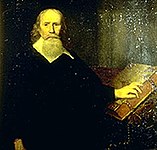John Clarke (Baptist minister), Date of Birth, Place of Birth, Date of Death
TweetJohn Clarke (Baptist minister)
American politician
 Date of Birth: 08-Oct-1609
Date of Birth: 08-Oct-1609
 Place of Birth: Westhorpe, England, United Kingdom
Place of Birth: Westhorpe, England, United Kingdom
Date of Death: 20-Apr-1676
Profession: physician, theologian
Nationality: United States
Zodiac Sign: Libra 
About John Clarke (Baptist minister)
- John Clarke (October 1609 – 20 April 1676) was a physician, Baptist minister, co-founder of the Colony of Rhode Island and Providence Plantations, author of its influential charter, and a leading advocate of religious freedom in America. Clarke was born in Westhorpe, Suffolk, England.
- He received an extensive education, including a master's degree in England followed by medical training in Leiden, Holland.
- He arrived at the Massachusetts Bay Colony in 1637 during the Antinomian Controversy and decided to go to Aquidneck Island with many exiles from the conflict.
- He became a co-founder of Portsmouth and Newport, Rhode Island, and he established America's second Baptist church in Newport.
- Baptists were considered heretics and were banned from Massachusetts, but Clarke wanted to make inroads there and spent time in the Boston jail after making a mission trip to the town of Lynn, Massachusetts.
- Following his poor treatment in prison, he went to England where he published a book on the persecutions of the Baptists in Massachusetts and on his theological beliefs.
- The fledgling Rhode Island colony needed an agent in England, so he remained there for more than a decade handling the colony's interests. The other New England colonies were hostile to Rhode Island, and both Massachusetts Bay and Connecticut Colony had made incursions into Rhode Island territory.
- After the restoration of the monarchy in England in 1660, it was imperative that Rhode Island receive a royal charter to protect its territorial integrity.
- It was Clarke's role to obtain such a document, and he saw this as an opportunity to include religious freedoms never seen before in any constitutional charter.
- He wrote ten petitions and letters to King Charles II and negotiated for months with Connecticut over territorial boundaries.
- Finally, he drafted the Rhode Island Royal Charter and presented it to the king, and it was approved with the king's seal on 8 July 1663.
- This charter granted unprecedented freedom and religious liberty to Rhode Islanders and remained in effect for 180 years, making it the longest-lasting constitutional charter in history. Clarke returned to Rhode Island following his success at procuring the charter; he became very active in civil affairs there, and continued to pastor his church in Newport until his death in 1676.
- He left an extensive will, setting up the first educational trust in America.
- He was an avid proponent of the notion of soul-liberty that was included in the Rhode Island charter—and later in the United States Constitution.
Read more at Wikipedia
See Also
- Famous People's Birthdays on 08 October, United Kingdom
- Famous People's Birthdays in October, United Kingdom
- Famous People's Birthdays on 08 October, United States
- Famous People's Birthdays in October, United States
- Famous physician's Birthdays on 08 October, United Kingdom
- Famous physician's Birthdays in October, United Kingdom
- Famous theologian's Birthdays on 08 October, United Kingdom
- Famous theologian's Birthdays in October, United Kingdom
- Famous physician's Birthdays on 08 October, United States
- Famous physician's Birthdays in October, United States
- Famous theologian's Birthdays on 08 October, United States
- Famous theologian's Birthdays in October, United States

